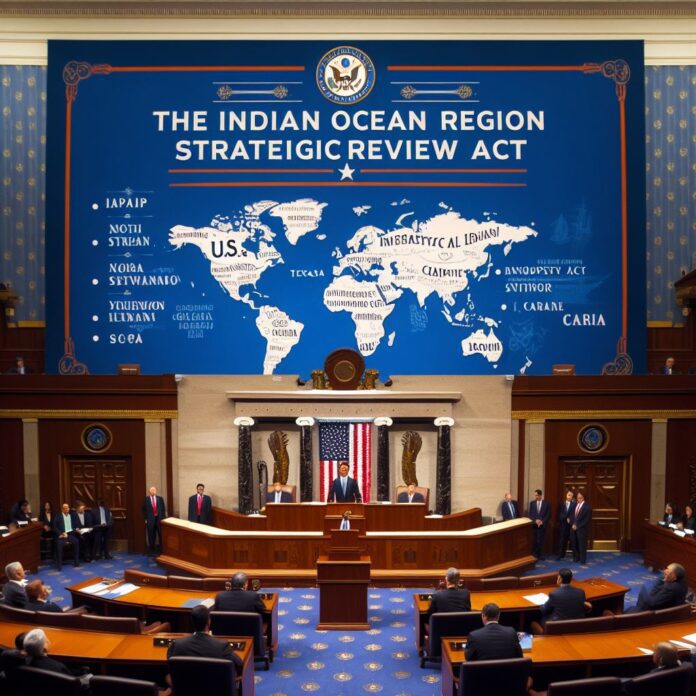The Indian Ocean Region Strategic Review Act is a legislative initiative proposed by members of the U.S. House of Representatives Foreign Affairs Committee. The act, sponsored by Representatives Joaquin Castro (Democrat, Texas) and Darrell Issa (Republican, California), calls for a comprehensive and cohesive U.S. strategy for the Indian Ocean region (IOR). The legislation is rooted in a recommendation from the Bipartisan US-China Economic and Security Review Commission, a body established in 2000 to assess and report on the U.S.-China relationship.
Strategic Importance of the Indian Ocean Region
The Indian Ocean is a crucial geopolitical and economic area. It serves as a major conduit for international trade, with significant shipping lanes that facilitate global commerce. The region is also rich in natural resources and has numerous strategic chokepoints such as the Strait of Hormuz and the Strait of Malacca. With growing international interest, particularly from China, the United States sees the necessity of a strategic presence and robust partnerships in this area.
Legislative Framework and Objectives
The Indian Ocean Region Strategic Review Act mandates the U.S. administration to formulate a multi-year strategy for the IOR. This strategy is to be developed in coordination with key departments including the Department of State, the Department of Defense, and the U.S. Agency for International Development (USAID). The legislation aims to:
- Enhance Economic Interests: Develop U.S. economic interests in the region by fostering commercial exchanges and economic development.
- Defend Freedom of Navigation: Ensure the protection of international shipping lanes and uphold the principle of freedom of navigation.
- Strengthen Regional Partnerships: Support and strengthen diplomatic ties with regional partners including Japan, Australia, India, the U.K., and France.
- Promote Security Cooperation: Foster military communication and intelligence sharing with strategic partners, particularly within the framework of the Quad (the U.S., India, Australia, and Japan).
- Mitigate Environmental Disasters: Enhance the capacity of regional governments and NGOs to respond to and mitigate environmental disasters.
Congressional and Strategic Context
The Commission’s November 2022 report highlighted the need for a focused U.S. strategy in the IOR. Representative Joaquin Castro, who supports the Biden administration’s Indo-Pacific strategy, believes that it disproportionately emphasizes the Pacific Ocean. He argues for increased prioritization of the Indian Ocean to counterbalance China’s growing influence in the region. The proposed legislation underscores the necessity for a multi-faceted approach, integrating diplomatic, defense, and development efforts. Within 180 days of the Act becoming law, the U.S. Secretary of State would be required to submit a detailed strategy and implementation plan for U.S. engagement and posture in the IOR. Read About The Proposed Regulation Here
Broader Implications and Challenges
Joshua T. White, a professor of international affairs at Johns Hopkins University and a former Director for South Asia at the National Security Council under President Barack Obama, suggests that while the Act may be largely symbolic, it signifies a critical shift in attention towards the IOR. He welcomes the initiative as a step towards more active U.S. engagement in an increasingly contested region.
You May Also Like to Read
Biofuel Scam Exposes Intrigue: CIA Ties, Turkish Tycoon and $1 Billion Fraud
Accurate Insights from Director Gacki: Strengthening AML/CFT Regulations
The timing of the bill is influenced by recent incidents, including attacks on ships in the Indian Ocean, which have heightened concerns about the security of sea lines of communication. The act aligns with a broader legislative focus on countering China’s influence in the Indo-Pacific, as highlighted by Mr. Castro’s spokesperson.
Future Prospects and Legislative Path
A previous version of this legislation was introduced in June 2021 and included in the America COMPETES Act, though it did not become law. However, given the rising geopolitical tensions and the strategic importance of the IOR, Congressman Castro remains optimistic about its inclusion in future legislative packages focused on competition with China and other bipartisan priorities.
The Act is part of a concerted effort by the U.S. Congress to channel strategic sentiments into effective and productive avenues of engagement within the Indo-Pacific region. By fostering closer ties with key regional players and enhancing strategic capabilities, the U.S. aims to maintain a stable and secure Indian Ocean region, countering any attempts by China to establish hegemony.
The Indian Ocean Region Strategic Review Act represents a significant legislative effort to formulate a comprehensive U.S. strategy for the Indian Ocean. By mandating coordinated action across multiple government departments and emphasizing the importance of regional partnerships, the Act aims to bolster U.S. interests and security in a strategically vital region. As global dynamics continue to evolve, the successful implementation of this strategy will be crucial in ensuring a balanced and secure Indo-Pacific.


